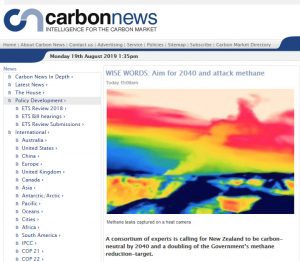Wise Response has submitted to the Climate Change Response Bill. The submission is available as a PDF here: Wise Response Submission to Climate Change Response Bill 160719
 The submission was covered in Carbon News:
The submission was covered in Carbon News:
WISE WORDS: Aim for 2040 and attack methane
Legislation before Parliament proposes cutting biogenic methane emissions by 10 per cent by 2030 and between 24 per cent and 47 per cent by 2050, and getting all other greenhouse gases to net-zero emissions by 2050.
But a group of nationally and internationally recognised experts says that is not enough to limit warming to 1.5deg.
“We recommend that the initial target for zero net emissions of GHG be brought forward to 2040,” the Wise Response Society says in a submission on the zero-carbon bill.
It also wants the initial target for biogenic methane to be set at a 20 per cent reduction by 2030, and says all targets should be “required”, ie compulsory, under the law.
WHO’S WHO
Wise Response is a non-profit organisation established in 2013 to push for a wise political and economic response to the threats of a changing climate.It is chaired by biologist Emeritus Professor Sir Alan Mark, has environment and constitutional law expert and former Prime Minister Sir Geoffrey Palmer as its patron and includes prominent scientists, artists and even sports people among its members.
The authors of the society’s zero-carbon bill submission read as a who’s who on the issue, and include climate scientists Dr Jim Salinger, Professor Martin Manning and Dr Tom Wigley, public policy expert Dr Jonathan Boston, Antarctic researcher Emeritus Professor Dr Peter Barrett, transition engineer Professor Susan Krumdieck, sustainable development expert Associate Professor Bronwyn Hayward, climate change adaptation expert Dr Stephen Knight-Lenihan, electricial engineer Ian Williamson and transition engineer Nathan Surendren, along with Mark himself.
ABRUPT SURGE
They say the science on methane emissions and their impacts is changing quickly.
“There has been an abrupt surge in methane since 2006,” the submission says.
“Methane has been increasing rapidly since 2014 from 1800 to 1850 parts per billion (ppb) by 2018. Methane levels have been climbing more steeply than climate scientists anticipated, to a degree so unexpected that it was not considered in pathway models preparatory to the Paris Agreement.”
